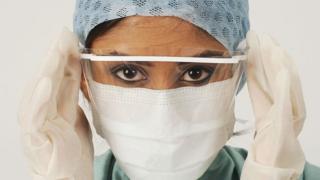 Image copyright Getty Images
Image copyright Getty Images Personal protective equipment (PPE) like masks and gloves helps stop the spread of coronavirus and saves lives.
The government says it’s boosting stocks and domestic manufacturing amid NHS workers’ concerns about supplies and being asked to consider reusing some equipment.
What is PPE and who should wear it?
Anyone who comes into close contact with patients who may or do have coronavirus should wear some form of protection. That includes staff working in care homes, prisons and the community, as well as in GP surgeries or hospitals.
The type of PPE required depends on the level of risk.
Guidelines say all hospital staff in both clinical and non-clinical roles should wear a facemask, while people visiting hospital or attending outpatient departments should wear some for of face covering.
In hospitals, anyone working within 2m (6ft) of a confirmed or suspected Covid-19 patient should wear an apron, gloves, a surgical mask and eye protection.
Clinicians carrying out tasks that could generate airborne droplets of saliva loaded with the virus should use an even higher standard of protection, including disposable gowns, filtering respirators and face-shielding visors.
For example, that would include intensive care doctors getting a patient ready to go on a ventilator to support their breathing.
Ambulance staff driving the ambulance (if the cab is closed off from the patient compartment) do not need to wear any PPE, but the rest of the crew should wear the appropriate amount depending on the likely level of exposure and risk they face.
Pharmacy staff who cannot keep 2m away from possible patients should wear a surgical mask.
How much kit has been sent out?
Since the start of the coronavirus outbreak, over 2.2 billion items of PPE have been delivered to the health and social care system in England, the Department of Health and Social Care (DHSC) confirmed on 25 June.
According to the BBC’s Panorama programme aired at the end of April, more than half of one billion PPE items distributed at that time were surgical gloves and, in most cases, each individual glove is counted rather than pairs.
The DHSC’s most recent breakdown of items of PPE delivered by 5 July included:
- 405 million masks
- 338 million aprons
- 4.2 million gowns
- 1.2 billion gloves (supplied and counted individually rather than as pairs)
The 2.2 billion figure also included body bags, swabs, clinical waste containers, cleaning equipment and detergent.
Around 30 billion items of PPE have been ordered overall from UK-based manufacturers and international partners to provide a continuous supply in the coming months.
The Welsh government says it has enough PPE for frontline health and care workers, although health minister Vaughan Gething said the country had been “within days” of running out during March and April.
In Northern Ireland, the UK has sent five million items of PPE in April and 75 million pieces have been ordered by its health service. The first part of a £60m consignment of PPE has been delivered from China.
Scotland, has increased the volume of PPE being made domestically and the amount being imported from abroad. NHS National Services Scotland is supplying more than 4.6 million surgical masks and 11 million gloves per week.
Is there enough PPE?
This is the vital question, but one that is difficult to answer for any given week.
Health Secretary Matt Hancock has said the amount needed each month is “absolutely vast” and in the “billions of items” ballpark.
There are around 1.6 million NHS staff across the UK in hospitals and the community who need varying amounts of PPE depending on the type of work they do.
PPE ordering is done on a UK-wide level, but different parts of the NHS has different levels of stock.
There have been some shortages, including the supply of gowns.
Global demand for PPE is at unprecedented levels and several countries have placed export bans on it.
NHS and social care workers can call a hotline to request PPE.
Health Secretary Matt Hancock said the UK can now begin to replenish its PPE stockpiles after brokering new deals and increasing UK manufacture.
This includes a deal for:
- masks with a company called Honeywell
- fabric for making gowns via Don and Low
- visors made by Jaguar Land Rover
MPS to grill health officials on PPE spending
Can PPE items be washed and reused?
Some bits of kit can only be used once per patient, while others can be used for whole sessions, such as during a ward round visit to many patients.
All PPE worn during the highest-risk situations – where there will be lots of splatter from infectious droplets – should be single use, unless they can be decontaminated.
Aprons, gloves and surgical masks should usually be disposed of after a single use or session.
However, when there are shortages, guidelines now say NHS staff can reuse some kit where it is safe to do so, even if it is labelled as single use by the manufacturer.
The Health and Safety Executive says it recognises “some compromise” is needed when there are extreme shortages of kit, and that these “exceptional circumstances” do not reflect its standard approach.
For example, some gowns could be washed by the hospital laundry and reused, it says.
It is easy to see how a member of staff would need to use lots of PPE when following the guidelines.
NHS Providers, whose members include health trusts, has thanked the fire and police services, vets, local councils, DIY stores and builders’ merchants which have donated stocks of gowns and alternatives such as coveralls.
What do NHS staff say?
The British Medical Association, which represents doctors in the UK, has criticised the advice that some single-use PPE could be reused.
“If it’s being proposed that staff reuse equipment, this must be demonstrably driven by science and the best evidence – rather than availability – and it absolutely cannot compromise the protection of healthcare workers,” said Dr Rob Harwood, chair of its consultants committee.
A BMA survey published on 18 April found that half of doctors working in high-risk areas reported shortages of long-sleeved disposable gowns and goggles.
The Royal College of Nursing says its members can refuse to treat patients as a “last resort” if adequate PPE has not been provided.
UK anaesthetic and intensive care bodies says doctors should carefully evaluate the risks before taking a decision about whether to provide care.
Source: BBC News – Health








